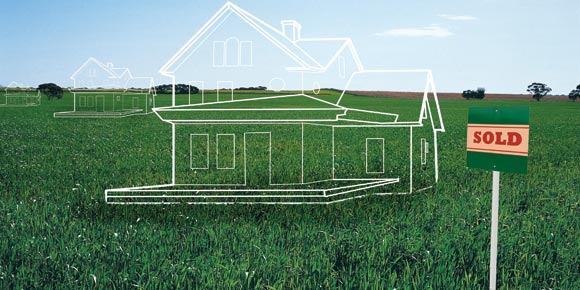by Dian Hymer
The price a buyer will pay for a home depends on many factors including current market conditions, interest rates, the size and condition of the property and the property location. The land that a residence sits on also affects the property’s value.
The utility of a lot can outweigh the importance of its size. For example, a house situated on a large piece of property that is very steep might sell for less than a similar house that’s on a flat lot. Home buyers often prefer properties that allow for easy indoor-outdoor living and provide level areas for children, pets and gardening. A steep lot provides none of this and in some cases it can create a maintenance headache. Homes on sloping lots can sell for a premium, however, if there are other compensating factors like a secluded setting or a magnificent view of a river or lake.
A critical factor in lot valuation is the size and character of typical lots in the area. In a subdivision where all the homes are on flat lots, the ones with the largest, usable yards usually command the highest prices. Homes that are located on lots that are smaller than what’s typical for an area often sell for less.
One homeowner whose home was on a lot that was small for the neighbourhood had a hard time selling even though she hired a decorator to stage the property inside and out. The lot was about 1,500 square feet smaller than the other lots in the neighbourhood. So, even though the home was well-located and had considerable charm, buyers discounted its price because of the small lot and minimal yard.
Buyers with small children usually want sizeable level yards that are easy to get to from the house. Busy professionals with no children often prefer small yards or decks because they require less maintenance.
Price range also plays a part. In the higher price ranges, the concept of owning land becomes an issue, so buyers usually want bigger lots. In expensive neighbourhoods, buyers often pay a premium price for a home that’s on a larger than average-size lot.
First-time tip: It’s wise to consider the resale potential of a property before you buy it. Ask your agent what buyers are typically looking for in your area. You may find that homes with low-maintenance lots and a sense of privacy are in the highest demand. In this case, lot size is not that important. But, a home that’s on a substandard lot may be difficult to sell in the future if buyers perceive this to be a defect.
Buying a property that has a defect is all right as long as it suits your needs and you realize that you may have to discount the price when you sell. To make sure that you aren’t overpaying for an atypical property, ask your agent to give you information about comparable properties with similar lot utility that have sold recently.
The closing: Market conditions enter into the equation. Depending on the current state of the market, buyers are usually willing to make more concessions than in a market that’s bloated with inventory.
— Inman News Features.



